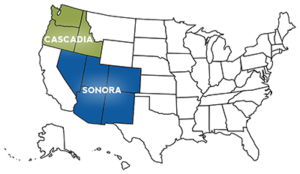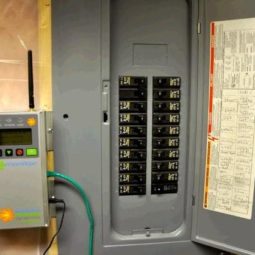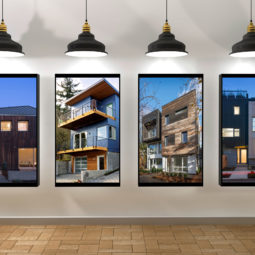2017 Green Building Grants
The Foundation’s green building work will use the expertise, network, and resources it has developed around energy efficiency policy and seize on the improved conditions its grantees and partners have helped to create, starting in two large-scale bioregions of the United States: Cascadia (Oregon, Washington, and Idaho) and Sonora (New Mexico, Arizona, Nevada, Utah and Colorado).

Cascadia (Oregon, Washington, Idaho)
Cascade Built – $55,788
To provide solar hot water heating for Pax Futura, a multi-family 35-unit Passive House certified green building project in the Columbia City neighborhood in Seattle; designated to be a first-of-its-kind, the building will be 20,190 square feet, with 50% of the units are offered at 65% of Area Median Income (AMI), through no formal affordability program and without any subsidy; Pax Futura will consume up to 90% less energy to heat and cool the units than standard buildings and use durable materials and construction techniques that will last for future generations; the project will also be Built Smart emphasizing resource conservation, employing pared down mechanical systems, superior insulation, no VOC finishes, and natural bio-retention planters to manage storm water onsite; the solar hot water heating project will use an innovative solar collector system optimized to produce 80% of the annual hot water load supplemented with an air-to-water heat pump; this hybrid system will provide all the energy needed for hot water in the building, including laundry, showers, and dishwashing, and will require no energy input from the electrical grid.
Community Frameworks – $89,131
To support the development of five new energy-efficient homes which will be sold to low and moderate income buyers with accompanying supportive services and down payment assistance to ensure their long-term success as homeowners; the project is focused in northeast Spokane which is one of the most economically distressed parts of the city; the High Performance green building project includes efficient building design, advanced framing, continuous external insulation, attic insulation, super-efficient windows, air tight construction, heat pumps, and a solar array to help bring the homes to Net Zero and Net Zero Ready (Department of Energy) certified status; incorporating additional energy efficiency investments into High Performance affordable housing should have a dramatic impact on the operating costs for the homebuyers enabling them to contribute more of their resources to other vital needs such as food, education and health care; green building project lessons learned and best practices will be shared via local, state, regional and national platforms.
Sonora (New Mexico, Arizona, Nevada, Utah, Colorado)
International Center for Appropriate & Sustainable Technology (ICAST) – $100,000
To identify service provider partners who are interested in providing solar and other renewable energy (RE) solutions to the Multi-Family Affordable Housing (MFAH) market but facing financing hurdles; to identify both equity and debt investor partners who are interested in providing the investments needed for the small scale solar and other RE solutions to the MFAH market; to facilitate partnerships, online convening, and charrettes regarding the development for an online platform that matches solar or other RE projects in need of financing, to equity and debt investors interested in the small scale RE projects for MFAH; to collect and analyze best practices and lessons learned to create a scalable solar and other RE financing model that can lead to an online platform that matches projects with investors; to develop a simple and replicable template for RE installations that minimizes the transaction costs for the MFAH market; to establish proof of concept of debt financing through TBL Fund for financing deep green retrofits including solar and other RE solutions; to design, develop and launch online videos that educate tenants on the importance of energy and water efficiency and trains them on how they individually can make triple-bottom line impacts by changing their behaviors to be more efficient in the use of scarce resources such as water and energy; to design and develop an online App, launch the app, and market it to MFAH properties and tenants.





